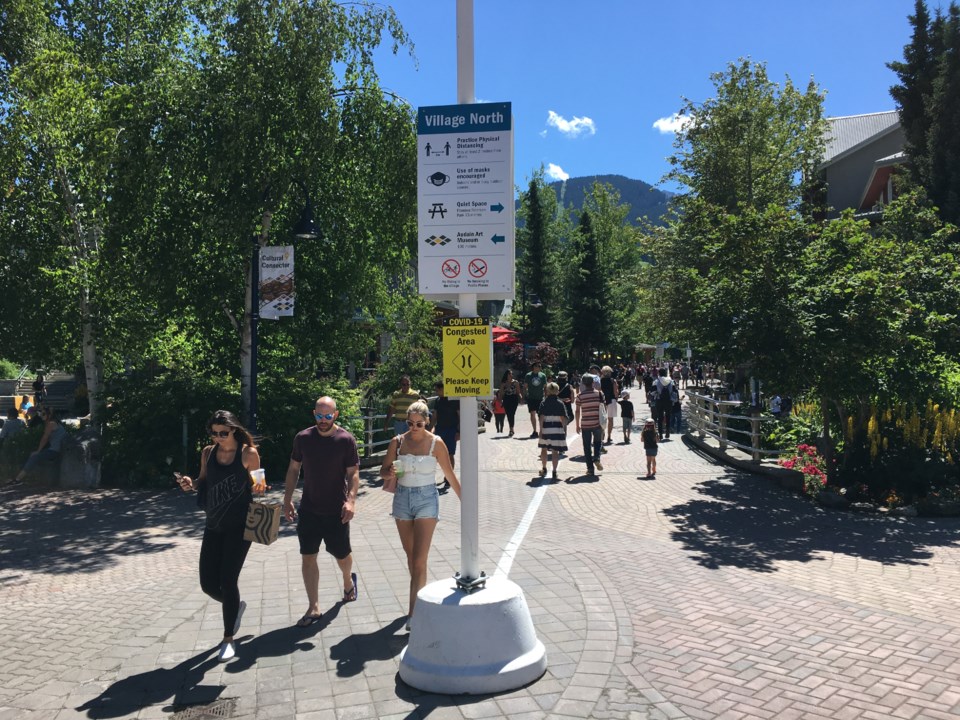This weekend, a family of eight sat down at Alta Bistro for dinner. It marked the first time that the Whistler eatery has served a group larger than six people in more than 15 months, said Eric Griffith, Alta Bistro's owner and president of the Restaurant Association of Whistler.
The provincial health order limiting group sizes at restaurants is one of several COVID-19 restrictions that lifted on Canada Day, as B.C. launched Phase 3 of its pandemic restart plan.
“It’s something [Whistler restaurants] have been working toward as a group since March 2020,” Griffith said. “So we’re very excited that we have some opportunity to increase our capacities in our restaurants, to do it safely … and ramp up our businesses coming into the summer, and then attempt to staff accordingly.”
Among a slate of changes, Phase 3 marks a return to normal for personal gatherings and liquor service hours. It saw the province’s state of emergency, limits on restaurant and gym capacities, and the mask mandate all come to an end—though masks are recommended in indoor public places for those who are not yet fully vaccinated. It’s the final phase of restrictions before the complete return to normal projected to take place in September.
Whistler’s Village Stroll was buzzing from July 1 to 4, lined with packed patios filled with people enjoying sunshine and loosened restrictions over the holiday weekend. And while businesses are adjusting to the influx in visitors and Phase 3 changes “as best as they can,” said Whistler Chamber of Commerce CEO Melissa Pace, challenges remain as, “There aren’t clear directives from Vancouver Coastal Health or WorkSafe BC around what new protocols there are.”
So, added Griffith, Whistler restaurants are determining their own parameters for protocols surrounding face coverings for staff, group size limits and seating capacity, in accordance with the province's current guidelines.
Some of those capacity limits, however, are being set with staffing in mind rather than just safety. Hindered by staff shortages, numerous businesses are also opting to cut service hours or close for a day or two throughout the week, Griffith explained.
“We can’t really run our businesses at full capacity at the moment,” he said. “We’re finding that even if we’d want to, it’s probably not possible right now.”
With staffing challenges currently impacting businesses’ ability to recoup pandemic losses during the summer holidays, Pace said the Chamber is calling on the federal government to extend wage- and rent-subsidy programs for businesses impacted by tourism beyond the programs’ September expiry.
Meanwhile at Whistler Blackcomb, the easing of restrictions “is still a work in progress,” said Marc Riddell, Vail Resorts’ director of communications, West Coast.
Riddell said the resort is continuing to work with Vancouver Coastal Health to determine ongoing safety protocols. For now, guests and staff are no longer required to wear masks, but are expected to maintain social distancing in line-ups with Vail Resorts-owned restaurants still operating at a 50 per cent capacity—though they are no longer taking reservations as they were throughout the winter.
So far, Whistler Blackcomb is not experiencing the same staffing challenges that other Whistler businesses are reporting this summer, explained Riddell.
“We’re able to run the operational footprint that we have here,” he said.
Regional visitors flocking back to Whistler as international borders remain closed
Notably for Whistler, Phase 3 of the province’s restart plan also invites recreational travellers from across Canada to visit British Columbia.
While Tourism Whistler wasn’t able to release final visitation figures for the Canada Day weekend, the organization's senior manager of corporate and member communications Lauren Everest confirmed that the booking pace for the Thursday, Friday and Saturday period of the weekend was sitting at close to 60 per cent, as of Monday, June 28—the highest booking pace Whistler has seen since the pandemic began.
Tourism Whistler is currently forecasting Whistler’s occupancy to reach 54 per cent in July and August. That’s comparable to the resort’s 52 per cent occupancy last summer, but significantly lower than the 83 per cent occupancy Whistler recorded in 2019.
With the Canada-U.S. border still closed and quarantine restrictions in place for non-vaccinated and non-Canadian travellers, Tourism Whistler is now targeting its marketing efforts toward major cities like Toronto, Calgary and Edmonton, Everest said.
“Our messaging is focused on ensuring that our Canadian guests feel invited and secure in coming back to Whistler, but we’re asking them to do so with a respect for the situation and a focus on responsible actions and behaviours,” she added.
“A lot of our summer marketing efforts are focused on content development to communicate important before-you-go information. For example, we want our guests to expect—and respect—safety protocols. We want them to recognize the importance of planning ahead and making reservations wherever possible to ensure the best possible experience, not only for them but also for our businesses too, which are still working hard to ramp back up to pre-pandemic service levels.”





